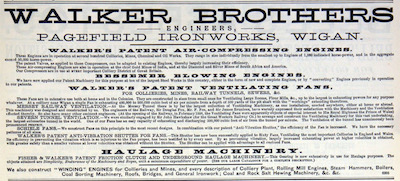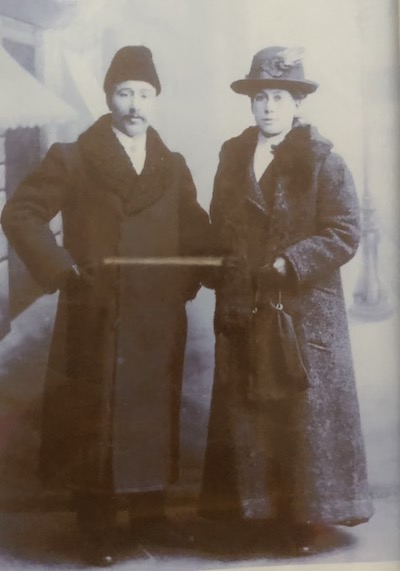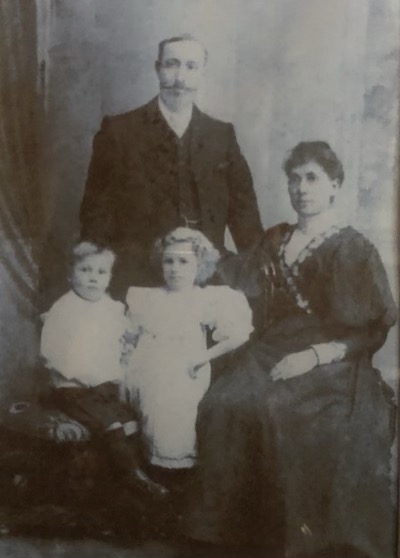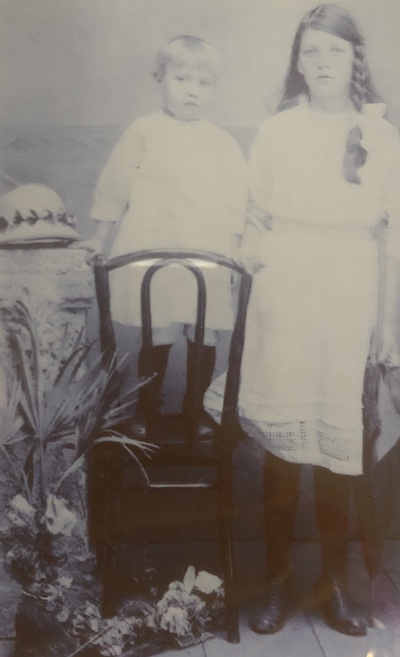A Family Link to Donbas
04/04/22 15:07 Filed in: Family
Was looking at a little information I have on my great grandfather, Peter Rigby from Wigan, the father of my grandmother Kathleen. He was a mining engineer who went out and lived in Ukraine in the first and second decade of the 20th Century. My grandma mentioned living there a few times in her later years (she lived to 98) and reminisced about escaping there before the Russian Revolution. She always mentioned Odessa when she talked about it (and said she only remembered the words for snow and sled from her time there - there was no mention of 'Rosebud' though), so I always thought they'd lived there. But reading an article about Peter it was actually Donestk (then called Hughesoffka). Maybe they had trips over to Odessa or my gran remembered traveling through it. The city was an industrial one and had several mining operations where Peter worked, ironically for a Mr J.H. Walker. Of course many years later his granddaughter would marry a Walker (aka dad). I assume there were no links (J.H. Walker was from Wigan, whilst all our Walker relations are from western Scotland).

The haulage engines used in the mines were supplied from Messrs Walker Brothers, Wigan.

Peter was born in 1874 and died in 1952. He was in Ukraine for some eleven years working for the colliery company ‘New Russia Co.’ He’d have been approximately 32 when he moved there and 43 on his return. According to an article about it, he actually tried to go back to Ukraine after returning with the family to Lancashire. I thought at first that perhaps he liked working there. But then I noticed his wife (Alice Jane Rigby) died that year so maybe he was running away from that? There is no-one to ask. At some point I may have to do some more work on the family tree and maybe some answers will be obvious - or at least there my be some clues. In any case he only made it as far as Newcastle though as in view of what was going on the ship was ordered not to sail.

There must have been a lot of British and other Europeans there before the Revolution. The town was split between a ‘workers’ and a ‘European’ area. And the town was called Hughesoffka after a Merthyr born engineer and entrepreneur John Hughes who founded the city after setting out there with ‘100 workers and their families’ mostly from the Welsh valleys in eight boats in 1870. They built an iron works there and collieries under the New Russia Company Ltd. The European workers, including Hughes’ brothers who ran the ironworks, left the city when the plant fell under the control of the Bolsheviks in 1917. Maybe Peter, with his wife and children left with the Hughes’? The city was to become Stalino in 1924 and then Donetsk in 1961.

It is strange to think that my grandmother spent some of her childhood in the capital of Donbas - the scene of so much death and destruction for years before even the current war; She would have been about 14 when she left and her sister, Marion, even younger. Donbas has been split into areas controlled by Ukraine and Pro-Russian Separatists after civil war supported by Russia since 2014. Incidentally in a nod to the reason my great grandfather and his family were over there, just over 105 years ago, the regional name Donbas is a portmanteau word from the ‘Donets Coal Basin’.

The haulage engines used in the mines were supplied from Messrs Walker Brothers, Wigan.

Peter was born in 1874 and died in 1952. He was in Ukraine for some eleven years working for the colliery company ‘New Russia Co.’ He’d have been approximately 32 when he moved there and 43 on his return. According to an article about it, he actually tried to go back to Ukraine after returning with the family to Lancashire. I thought at first that perhaps he liked working there. But then I noticed his wife (Alice Jane Rigby) died that year so maybe he was running away from that? There is no-one to ask. At some point I may have to do some more work on the family tree and maybe some answers will be obvious - or at least there my be some clues. In any case he only made it as far as Newcastle though as in view of what was going on the ship was ordered not to sail.

There must have been a lot of British and other Europeans there before the Revolution. The town was split between a ‘workers’ and a ‘European’ area. And the town was called Hughesoffka after a Merthyr born engineer and entrepreneur John Hughes who founded the city after setting out there with ‘100 workers and their families’ mostly from the Welsh valleys in eight boats in 1870. They built an iron works there and collieries under the New Russia Company Ltd. The European workers, including Hughes’ brothers who ran the ironworks, left the city when the plant fell under the control of the Bolsheviks in 1917. Maybe Peter, with his wife and children left with the Hughes’? The city was to become Stalino in 1924 and then Donetsk in 1961.

It is strange to think that my grandmother spent some of her childhood in the capital of Donbas - the scene of so much death and destruction for years before even the current war; She would have been about 14 when she left and her sister, Marion, even younger. Donbas has been split into areas controlled by Ukraine and Pro-Russian Separatists after civil war supported by Russia since 2014. Incidentally in a nod to the reason my great grandfather and his family were over there, just over 105 years ago, the regional name Donbas is a portmanteau word from the ‘Donets Coal Basin’.
blog comments powered by Disqus